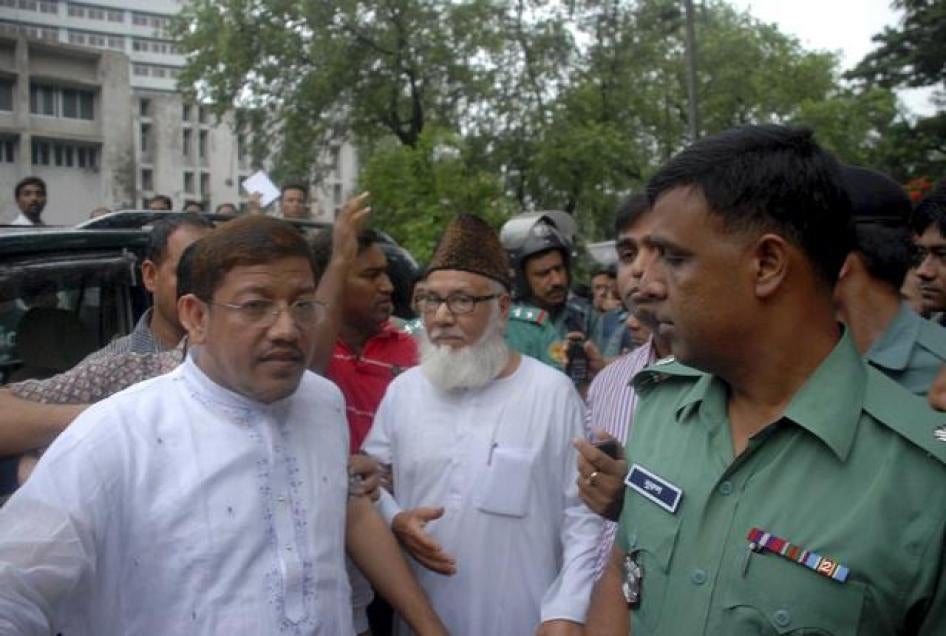(New York) – The death sentence against Motiur Rahman Nizami, the head of Bangladesh’s Jamaat-e-Islaami party, should be suspended with immediate effect, Human Rights Watch said today. The Supreme Court’s May 5 rejection of his review petition means that Nizami could be hanged in the coming days after the deadline to appeal for presidential clemency expires.
Nizami was convicted for war crimes allegedly committed by forces under his command during Bangladesh’s 1971 war of independence by the country’s specially constituted International Crimes Tribunal (ICT) in 2014.
Several prominent international observers have expressed serious concerns over previous death penalty convictions handed down by the ICT due to concerns over fair trials.
“Human Rights Watch opposes the death penalty in all circumstances as an irreversible, degrading, and cruel punishment,” said Brad Adams, Asia director at Human Rights Watch. “It is particularly problematic when there are questions about whether proceedings meet fair trial standards.”
Nizami was charged with 16 counts of genocide, crimes against humanity, and war crimes allegedly committed by forces under his command, known as the Al-Badr, during Bangladesh’s 1971 war of independence. Nizami was allegedly the leader of Al-Badr, a paramilitary organization which supported the then West Pakistan army against the East Pakistan army and was responsible for some of the worst crimes which took place during the 1971 war of independence.
In October 2014 Nizami was found guilty of eight of these charges. He was sentenced to death for being complicit in genocide and crimes against humanity on four charges of rape and killings of intellectuals. Nizami appealed the convictions in November 2014. In January 2016, the Supreme Court acquitted Nizami of three of the eight charges, including a death penalty charge, but upheld five, including three death penalty charges. In March 2016 Nizami filed a petition asking for a review of his case. That petition, his final chance for a rehearing, was denied last week.
As in other cases before the ICT, the court put an arbitrary limit on the number of witnesses Nizami could call to defend himself against charges of war crimes. Nizami was ultimately allowed to call just four witnesses in his defense. He was not allowed to challenge prosecution witnesses who allegedly had offered prior inconsistent testimony. Conversations leaked to the Economist as part of the “Skypegate” scandal also revealed that the Nizami trial was unlawfully discussed by the presiding judge, the prosecution, and an external consultant, who were heard debating trial strategies.
Human Rights Watch strongly supports the need for justice and accountability for war crimes committed during Bangladesh’s 1971 conflict but has pointed out numerous shortcomings in ICT proceedings leading to flawed judgments and, in some cases, hangings, despite well-documented fair trial concerns.
Human Rights Watch reiterated its long-standing call for the government of Bangladesh to restore fundamental rights of protection to those accused of war crimes. Bangladesh’s problematic article 47A(1) of the constitution specifically strips those accused of war crimes of their fundamental rights, including the right to an expeditious trial by an independent and impartial court or tribunal. This pernicious amendment to the constitution allows the ICT overly broad discretion to deny those charged with war crimes the same rights and procedures as other defendants.
Human Rights Watch also called on the Bangladeshi government to impose a moratorium on the death penalty with a plan to abolish it altogether. Over 20 people have been executed since the Awami League government took office in 2009.
“While many in Bangladesh believe Nizami to be guilty and want him punished, justice is only served through fair trials,” said Adams. “Instead of expedited hangings, authorities in Bangladesh should do everything possible to ensure that victims receive accurate answers about responsibility for crimes of such gravity and magnitude.”








